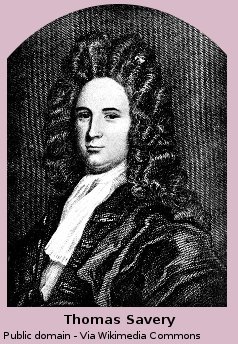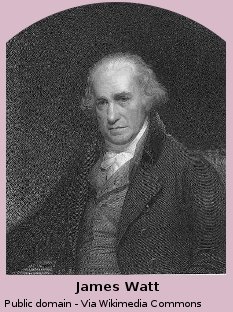Human Intelligence
Applied Diligently Solves Problems
Part 13 - Part 12
Egotism And Greed Trumps Human Intelligence
Human intelligence is being exercised with energetic frequency, as the Industrial Age gains momentum. But as we notice here, often ego and greed are favored over Accurate Thinking. This is a phenomenon common to our Current Era.

In the Mechanical arena, Denis Papin, (1647-1712) a French born Mathematician, and English born Thomas Savery, (1650-1715) former British Military Engineer, savvy marketer, and the author of a book entitled The Miner's Friend, were experimenting with the potential Power inherent in Steam.
Each Independent of the other.
Papin, discoverer of the concept of the now ubiquitous pressure cooker, was, earlier, an assistant to Christiaan Huygens. He was the first Mind to build a piston Steam Engine.
It seems,
because he could not raise finance for further development, Denis Papin's device lay
idle.
Thomas Savery, who, on the other hand, built a Vacuum Pump Engine, had money of his own to invest in his machine and was well prepared commercially. He was granted a fourteen year long patent on a device to be used to pump water from under-ground coal-mines.

Intentions Count
Thomas described the workings of his invention in elegantly seductive terms. The benefits he promised were substantial, and persuasively presented.
However . . .
While Savery's machine worked, it was simply not at all efficient, nor did it possess the capacity to pump water from the bottom of deep coal pits.
Savery's
inspiration to build his Steam Engine may have been the dire necessity
to evacuate the deep mines of an essential industry in his Country. Or
it may have been a mere exploitation of a commercial opportunity.
Although his appliance did not perform satisfactorily, he was awarded a further twenty one years of Patent Protection by an Act of Parliament.
This protection covered all engines that raised water by fire. In an exhibition of blind Emotion
overruling intuitive Human intelligence, no consideration was given to
configuration of the structure of these machines. Was this incredible
decision a demonstration of egotistical greed or was it incompetence, emphasizing a dearth of Thinking Skills? Even today, not an isolated or uncommon occurrence.
Dearth of plot and narrowness of imagination . . . John Dryden criticizing Drama
Expression only protected
To place this in perspective,
In America, Henry Ford obtained a patent for the V8 Internal Combustion
Engine layout. His innovative configuration allowed the engine block to
be cast in one piece, which gave him a huge economic advantage over
existing designs.
This did not prevent the production by others
of eight cylinder engines, Vee configuration or otherwise, or flat fours
or any other form. Henry's expression of an idea was protected, not the idea itself. And rightly so.
Better Thinking - but - -
Expanding on the earlier efforts of Denis Papin, Thomas Newcomen
(1664-1729) spent around ten years building a working example of an
Atmospheric Piston Engine. Generally recognized as the first
industrially usable steam engine.
An Atmospheric Piston Engine
means that the piston is forced to move with the pressure of the
atmosphere bearing down on it at 14.7 lb per sq inch at sea level, the
pressure reducing exponentially the higher the elevation. The necessary
vacuum that allows this to happen is produced by the condensation of
steam inside a cylinder.
Even though Newcomen possessed a
different, and far superior, concept, to that of Thomas Savery, he was
stymied by Savery's Patent, and was compelled to form a partnership with
him. Subsequently it was Newcomen's engine that was used to dry out the
mines.
Not withstanding the fact that in this instance the law
was an ass, Thomas Newcomen had no alternative if he were to legally
commercialize his own design.
The arrangement between Savery and
Newcomen was a compromise of the type that is only too common today,
when participants in deals relegate their Human intelligence in favor of
greed and egoism.
Best Thinking
Not withstanding the superiority of the Newcomen Engine over the design of Savery's offering, Newcomen's engine was not a model of efficiency.

It required a mind of the caliber of Scottish born James Watt (1736-1819) to improve Newcomen's engine to the stage it was a worthy candidate to be put into reliable widespread industrial service.
Watt,
an instrument maker by trade, who could turn his hand to repair almost
anything, was an intuitive Thinker of the first order.
It could
be said that James Watt's improvements to the Newcomen Engine provided
the Power that kicked started the Industrial Revolution.
Watt, an admirable man, would have felt at ease among other Good Humans, such as his American contemporary, Benjamin Franklin.
The SI unit, of Power, the Watt, was designated in James honor.
With James Watt at the vanguard of Steam Engine development, Steam became king and the driving force of industry.
James Watt was in charge of both his Ego and Human intelligence
Human Intelligence Rocks!
Part 13 - Part 12
Next - More Great Minds





